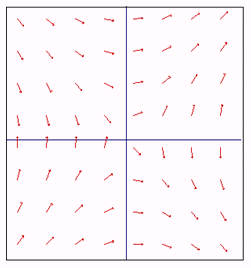1) Find a)
a) 
b) 
c) 
d) 
*e) 
2) The function g is defined by the formula Find the slope of the tangent line at x = 1.
Find the slope of the tangent line at x = 1.
a) 
*b) 
c) 
d) 
e) 
3) Find *a) 4
*a) 4
b) 
c) 1
d) 
e) The limit does not exist.
4) The given function f has a removable discontinuity at x = -5. Find A. a) -15
a) -15
b) -5
c) 5
d) -4
*e) -25
5) If f ' (x) =  which of the following is true about y = f (x)?
which of the following is true about y = f (x)?
*a) f has a point of inflection at x = 2 and a local maximum at x = 8.
b) f has a local maximum at x = 2 and a local minimum at x = 8.
c) f has a local minimum at x = 2 and a local maximum at x = 8.
d) f has a point of inflection at x = 2 and a local minimum at x = 8.
e) f has a local minimum at x = 2 and a point of inflection at x = 8.
6) Find f ' (9), given that a)
a) 
b) 
*c) 
d) 
e) 
7) Find the average value of the given function f over the interval [0, 4]. a)
a) 
*b) 
c) 
d) 
e) 
8) Find f ' (0), given that a)
a) 
b) 
*c) 
d) 
e) 
9) Find f ' (1), given that a)
a) 
b) 
c) 
*d) 
e) 
10) Find a) The limit does not exist.
a) The limit does not exist.
b) -10
c) 1
*d) 0
e) 10
11) Given the following curve, find  .
.
a) 
b) 
c) 
*d) 
e) 
12) Given that f(x) = 7sin2(4x), find f '' .
.
a) 
b) 
c) 
*d) 
e) 
13) Find the midpoint rectangular approximation for using 3 subintervals of equal length.
using 3 subintervals of equal length.
a) 
b) 
*c) 
d) 
e) 
14) Find the derivative of the function y = cos-1 (3x).
a) -3sin-1(3x)
b) 
c) 
*d) 
e) 
15) Find a)
a) 
b) 
c) 
*d) 
e) 
16) Find the equation of the tangent line to the given curve at the point (0, 9). a)
a) 
b) 
c) 
*d) 
e) 
17) If g(f(x)) = x, g(5) = 2 and g'(5) = 13, then f '(2) is
*a) 
b) 
c) 
d) 
e) 
18) Given that 
find 
*a) 
b) 
c) 
d) 
e) 
19) Which of the following differential equations corresponds to the slope field shown in the figure below?

*a) 
b) 
c) 
d) 
e) 
20) Given the following function, with x > 0, on which interval is the function decreasing? *a)
*a) 
b) 
c) 
d) 
e) 
21) Find the area of the region enclosed by the graphs of and
and *a)
*a) 
b) 
c) 
d) 
e) 
22) Find a)
a) 
b) 
c) 
d) 
*e) 
23) The region bounded by the following graph
and the x-axis, for 0 < x <  , is rotated about the line y = -4. The volume of this solid can be represented by:
, is rotated about the line y = -4. The volume of this solid can be represented by:
a) 
b) 
c) 
*d) 
e) 
24) The side of a cube is expanding at a constant rate of 4 inches per second. What is the rate of change of the volume, in in3 per second, when the total surface area of the cube is 54 in2?
a) 36
*b) 108
c) 72
d) 12
e) 216
25) The solution to the differential equation
with the initial condition y(0) = 3 is
a) 
*b) 
c) 
d) 
e) 
26)  =
=
*a) 
b) 
c) 
d) 
e) 
27) The position of a particle moving along a horizontal line is given by What is the maximum speed of the particle for 0 < t < 10?
What is the maximum speed of the particle for 0 < t < 10?
a) 54
b) 98
*c) 294
d) 162
e) 18
28) Using the information below, find when t = 0.
when t = 0.

 a)
a) 
b) 
c) 
d) 
*e) 

















 which of the following is true about y = f (x)?
which of the following is true about y = f (x)?
























 .
.





 .
.




 using 3 subintervals of equal length.
using 3 subintervals of equal length.


























































 , is rotated about the line y = -4. The volume of this solid can be represented by:
, is rotated about the line y = -4. The volume of this solid can be represented by:










 =
=





 when t = 0.
when t = 0.






